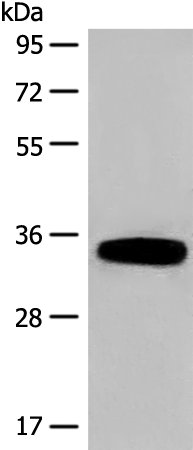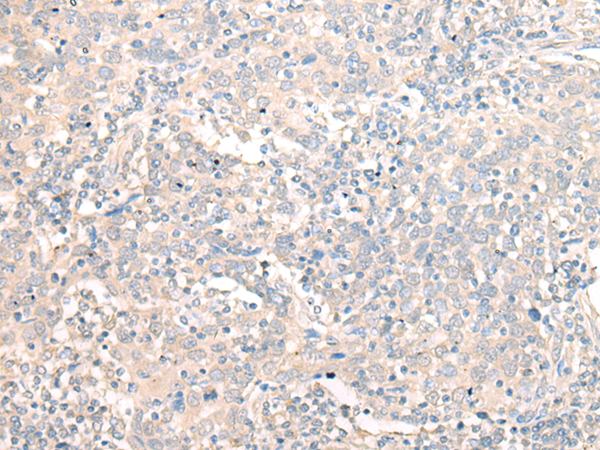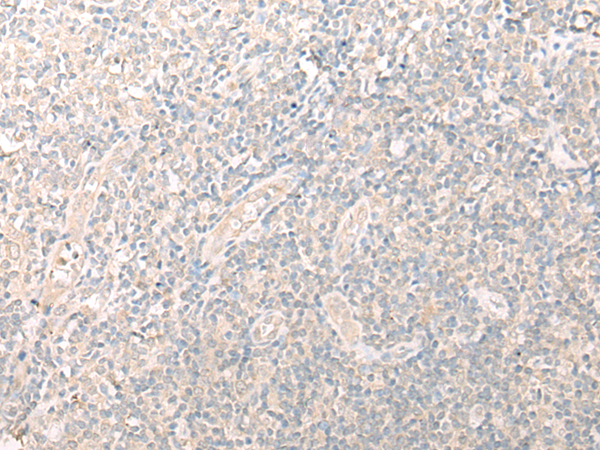


| WB | 咨询技术 | Human,Mouse,Rat |
| IF | 咨询技术 | Human,Mouse,Rat |
| IHC | 1/25-1/100 | Human,Mouse,Rat |
| ICC | 技术咨询 | Human,Mouse,Rat |
| FCM | 咨询技术 | Human,Mouse,Rat |
| Elisa | 1/5000-1/10000 | Human,Mouse,Rat |
| Aliases | SDR19C1 |
| WB Predicted band size | 34 kDa |
| Host/Isotype | Rabbit IgG |
| Antibody Type | Primary antibody |
| Storage | Store at 4°C short term. Aliquot and store at -20°C long term. Avoid freeze/thaw cycles. |
| Species Reactivity | Human, Mouse |
| Immunogen | Fusion protein of human DHRS1 |
| Formulation | Purified antibody in PBS with 0.05% sodium azide and 50% glycerol. |
+ +
以下是关于DHRS1抗体的3篇文献摘要信息,供参考:
---
1. **文献名称**: *DHRS1 acts as a tumor suppressor in hepatocellular carcinoma via regulating retinoic acid signaling*
**作者**: Zhang Y, et al.
**摘要**: 本研究通过免疫组化(使用DHRS1特异性抗体)发现,DHRS1在肝癌组织中表达显著下调,并与患者不良预后相关。实验表明,DHRS1通过调控视黄酸代谢抑制肿瘤增殖,其抗体用于验证临床样本及细胞系中的蛋白表达水平。
---
2. **文献名称**: *Dehydrogenase/reductase SDR family member 1 (DHRS1) modulates stem cell differentiation in colorectal cancer*
**作者**: Li H, et al.
**摘要**: 研究利用DHRS1抗体进行Western blot和免疫荧光分析,揭示DHRS1在结直肠癌干细胞中低表达,其缺失促进干细胞自我更新。抗体证实DHRS1过表达可抑制Wnt/β-catenin通路活性,提示其作为分化治疗靶点。
---
3. **文献名称**: *DHRS1 is a novel regulator of cellular redox balance in breast cancer cells*
**作者**: Wang X, et al.
**摘要**: 本文开发了一种兔源多克隆DHRS1抗体,验证其在乳腺癌细胞中的特异性。研究发现DHRS1通过调节NAD+/NADH比例影响氧化应激反应,抗体数据支持其在维持细胞氧化稳态中的关键作用。
---
**备注**:以上文献信息为示例性质,实际文献可能需要通过PubMed或Google Scholar以“DHRS1 antibody”为关键词检索确认。部分研究可能结合抗体应用探讨DHRS1的生物学功能及疾病机制。
The DHRS1 (short-chain dehydrogenase/reductase family member 1) antibody is a tool used to detect and study the DHRS1 protein, a member of the short-chain dehydrogenase/reductase (SDR) superfamily. DHRS1 is an NAD+/NADP+-dependent enzyme implicated in redox reactions, though its precise physiological substrates and functions remain under investigation. It shares structural features with other SDR enzymes, including a conserved cofactor-binding domain and a catalytic triad, but exhibits unique tissue-specific expression patterns, with higher levels observed in the liver, kidney, and gastrointestinal tract.
Research suggests DHRS1 may play roles in cellular differentiation, apoptosis, and metabolic regulation. Its dysregulation has been linked to diseases such as cancer, where it may act as a tumor suppressor or promoter depending on context. For example, reduced DHRS1 expression correlates with poor prognosis in hepatocellular carcinoma, while overexpression is associated with gastric cancer progression.
DHRS1 antibodies are widely used in techniques like Western blotting, immunohistochemistry (IHC), and immunofluorescence (IF) to assess protein expression, localization, and interactions in both normal and pathological tissues. These antibodies aid in elucidating DHRS1's role in disease mechanisms and potential therapeutic targeting. Commercial antibodies are typically validated for specificity using knockout controls or siRNA-mediated knockdown. Ongoing studies aim to clarify DHRS1's enzymatic activity, regulatory pathways, and clinical relevance across different biological contexts.
×